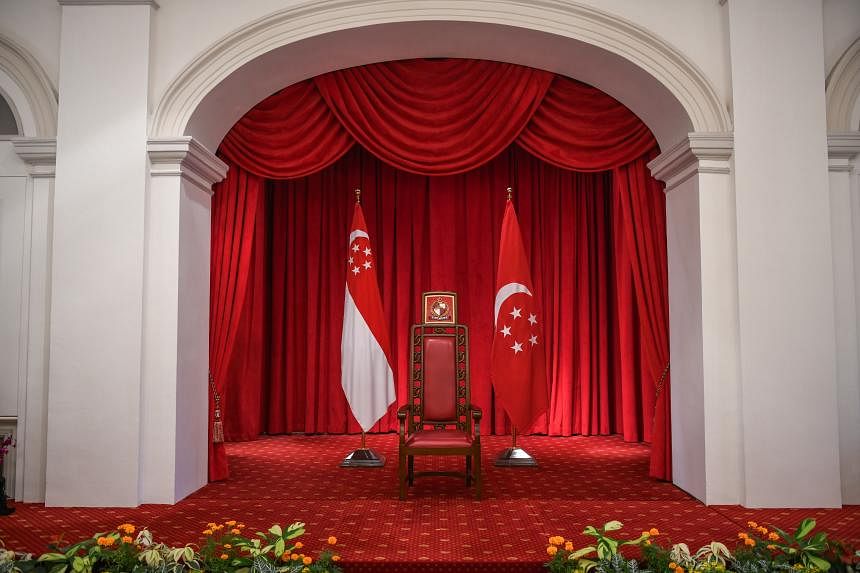SINGAPORE - The Elections Department (ELD) has released an explanatory note on the role of the president, which has been seen by the candidates of the presidential election to ensure they understand the position.
The three contesting for the presidency are former GIC chief investment officer Ng Kok Song, former senior minister Tharman Shanmugaratnam and former NTUC Income chief executive Tan Kin Lian.
The three made a statutory declaration on their nomination paper that they have read the explanatory material and understand the president’s role under the Constitution.
An ELD spokesman said: “Candidates have signed an undertaking to campaign for election as president in a manner that is dignified, decorous and consistent with the president’s position as the head of state and the symbol of national unity.”
Under the Constitution, the president is the head of state and the symbol of national unity. He presides over important national events, such as the National Day Parade and the opening of Parliament, and exercises custodial powers.
The president also stands above party politics and, therefore, cannot be a member of a political party.
How the president works with Parliament and the Cabinet
The Cabinet has the general direction and control of the Government, and makes and implements policies. The Cabinet is led by the prime minister, who must command the confidence of Parliament.
The Cabinet as a whole is collectively responsible to Parliament and, in turn, Parliament is responsible for scrutinising and passing legislation.
The Cabinet and Parliament are ultimately accountable to the electorate for the laws and policies that they make.
The Constitution requires the president to act on the Cabinet’s advice in exercising his functions, except in specific areas where the Constitution empowers the president to act in his discretion.
The president’s custodial functions
The Constitution confers on the president a number of custodial powers.
These powers enable the president to veto certain proposed measures, notwithstanding the advice tendered by the Cabinet. These custodial powers fall into three broad categories.
The first category concerns Singapore’s past reserves that were not accumulated during the present term of the Government.
The president is empowered to vet, and can decide to veto measures taken by Parliament or the Government that he considers would draw on past reserves.
For example, the president can refuse to assent to a Supply Bill passed by Parliament if, in his opinion, the Bill would draw on the Government’s past reserves. This extends to key statutory boards like the Housing Board (HDB), Monetary Authority of Singapore and Central Provident Fund (CPF) Board, as well as key government companies such as Temasek and GIC.
The president can disapprove the budgets and transactions of these entities if he considers that they draw on the entities’ past reserves.
The second category concerns the public service. The president can veto appointments to key public offices, such as the chief justice and the judges of the Supreme Court, and the commissioner of police.
The president can also veto the removal of individuals from these appointments.
The third category serves a protective function. The president can authorise an investigation by the director of the Corrupt Practices Investigation Bureau if the prime minister refuses to give such authorisation.
The president’s concurrence is required for a person to be detained under the Internal Security Act (ISA) if the ISA advisory board recommends against the detention.
The president can also cancel or vary a restraining order made under the Maintenance of Religious Harmony Act if the Cabinet’s advice is contrary to the recommendation of the Presidential Council for Religious Harmony.
When exercising the first two categories of custodial powers, the president must consult the Council of Presidential Advisers.
If the president exercises a veto contrary to the recommendation of the council, Parliament can vote to overrule the president. A motion to overrule the president must be supported by not less than two-thirds of the total number of MPs (excluding nominated MPs).
Public role
The public role of the president reflects the constitutional powers and duties of the office. As the head of state, the president is the symbol of national unity.
The president must be, and be seen to be, politically neutral. The president has no independent political role and must not get involved in political or controversial issues.
This way, the president stays above the political fray.
Publicly, the president must speak and act in accordance with the advice of the Cabinet, especially when expressing views on legislation or government policy. The exception is on matters related to the president’s custodial powers, where the president acts in his discretion, and is naturally entitled to explain to the public how he has exercised, or intends to exercise, these powers.
In private discussions with the prime minister, the president can share his advice freely, but these discussions must remain confidential.
Examples of what the president can and cannot do
While the president can veto appointments to key statutory boards like the CPF Board and HDB, he cannot appoint his own preferred candidates to these key appointments.
The president can veto Supply Bills that draw on the Government’s past reserves, but he cannot veto Bills that increase tax rates.
The president can deliver the address at the opening of Parliament, which is drafted by the Government and sets out the Government’s agenda, but he is not allowed to publicly express views on legislation or government policy without being advised to do so by the Government.


